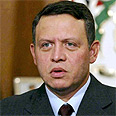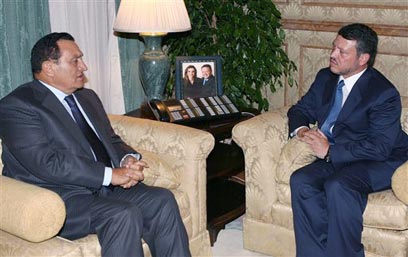


Egypt: Fix Palestinian borders first
King Abdullah, President Mubarak call on international community to revive peace negotiations between Israel, Palestinian Authority. 'Unilateral approaches have proved their failure in dealing with the issues,' leaders say. New peace proposal calls for fixing borders of Palestinian state before working to make it a reality
Jordan's King Abdullah and Egyptian President Hosni Mubarak on Sunday urged the international community to work for a speedy resumption of Middle East peace talks, officials said.
They said both leaders agreed at a brief summit talks in Amman that an end to the Arab-Israeli conflict could only come about by a comprehensive settlement based on past UN resolutions as well as on the basis of land for peace.
"There is a need to bring back the two sides to the negotiating table at the earliest time on a basis that guarantees the rights of Palestinians and a respect for past resolutions of international legitimacy," said a palace statement at the end of their talks.
The two pro-US allies, Egypt and Jordan, also discussed an Arab peace plan they have helped draft to refer the Arab-Israeli conflict back to the UN Security Council when it is heard in New York later this month.
"Unilateral approaches have proved their failure in dealing with the issues and there cannot be an alternative to comprehensive solutions," the two leaders said in the statement.
A new approach
Egypt and Jordan along with their ally Saudi Arabia concluded that international efforts to resuscitate the stalled peace process had failed and a new approach was needed, officials say.
The new Arab peace plan seeks to benefit from the political fallout of Israel's 34-day war against Lebanon to push the international community to reshape the Middle East peace process, officials say.

President Mubarak and King Abdullah (Photo: AP)
Specifically, Egypt's proposed plan is based on fixing in advance the borders and other details of a Palestinian state and then setting up negotiations to turn the concept into a reality on the ground.
The approach is a radical departure from the one which has dominated Middle East diplomacy for most of the past 15 years, most recently the 2003 Road Map, which was based on persuading Israelis and Palestinians to build confidence gradually through small steps.
The Egyptian idea is similar to the concept proposed by King Abdullah in an interview in the latest edition of Time magazine. President Mubarak flew to Jordan earlier on Sunday to coordinate plans with the Jordanian king.
In his interview with Time, King Abdullah said peace negotiations would be helpful in the short term but added: "We want to jump ahead to something tangible. We need to get to the point where people want to sign on the dotted line. We want to move to a two-state solution, but we are not going to go back and forth with lawyers until we get there."
Egyptian Foreign Minister Ahmed Aboul Gheit elaborated: "The necessary thinking which everyone
must focus on ... Is on how to conceptualise what is referred to as the endgame. The endgame is the Palestinian state…If we agree on a Palestinian state, its borders and its parameters, then we can deal from there, through negotiations, to try and achieve this aim."















